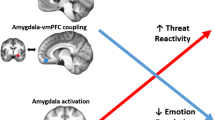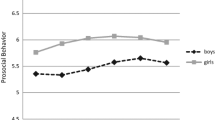Abstract
Psychopathy involves impaired capacity for prudential and moral reasoning due to impaired capacity for empathy, remorse, and sensitivity to fear-inducing stimuli. Brain abnormalities and genetic polymorphisms associated with these traits appear to justify the claim that psychopaths cannot be morally responsible for their behavior. Yet psychopaths are capable of instrumental reasoning in achieving their goals, which suggests that they have some capacity to respond to moral reasons against performing harmful acts and refrain from performing them. The cognitive and affective impairment of the psychopath justifies mitigated responsibility, but not excuse.
Similar content being viewed by others
References
Anderson, S.W. et al. 1999. Impairment of social and moral behavior related to early damage in human prefrontal cortex. Nature Neuroscience 2: 1032–1037.
Aristotle. 1984. Nicomachean Ethics. In The Complete Works of Aristotle, Revised Oxford Translation, Volume Two, Jonathan Barnes, ed. Princeton: Princeton University Press.
Bechara, A. et al. 1994. Insensitivity to future consequences following damage to the human prefrontal cortex. Cognition 50: 7–14.
Bechara, A. et al. 1999. Different contributions of the human amygdala and ventromedial prefrontal cortex to decision-making. Journal of Neuroscience 19: 5473–5481.
Bechara, A. et al. 2000a. Characterization of the decision-making defect of patients with ventromedial prefrontal cortex lesions. Brain 123: 2189–2102.
Bechara, A. et al. 2000b. Emotion, decision-making, and the orbitofrontal cortex. Cerebral Cortex 10: 295–307.
Bechara, A., and M. Vander Linden. 2005. Decision-making and impulse control after frontal lobe injuries. Current Opinion in Neurology 18: 784–790.
Berkowitz, L. 1993. Aggression: its causes, consequences, and control. Philadelphia: Temple University Press.
Blair, J. 1995. A cognitive development approach to morality: investigating the psychopath. Cognition 57: 1–29.
Blair, J. 1997. Moral reasoning in the child with psychopathic tendencies. Personality and Individual Differences 22: 731–739.
Blair, J. 2003. Neurobiological basis of psychopathy. British Journal of Psychiatry 182: 5–7.
Blair, J., and L. Cipolotti. 2000. Impaired social response reversal: a case of ‘acquired sociopathy’. Brain 123: 1122–1141.
Blair, J., D. Mitchell, and K. Blair. 2005. The psychopath: emotion and the brain. Malden, MA: Blackwell.
Bratman, M. 1987. Intention, plans, and practical reason. Cambridge, MA: Harvard University Press.
Camille, N. 2004. The involvement of the orbitofrontal cortex in the experience of regret. Science 304: 1167–1170.
Damasio, A. 1994. Descartes’ error: emotion, reason, and the human brain. New York: Grosset/Putnam.
Damasio, A. 2000. A neural basis for sociopathy. Archives of General Psychiatry 57: 128–129.
Damasio, A. 2007. Neuroscience and ethics: intersections. American Journal of Bioethics—Neuroscience 7(1): 3–7.
Damasio, H. et al. 1994. The return of Phineas Gage: the skull of a famous patient yields clues about the brain. Science 264: 1102–1108.
Diagnostic and Statistical Manual of Mental Disorders, fourth edition, text revision (DSM-IV-TR). 2000. Washington, D. C.: American Psychiatric Association.
Duff, R.A. 1977. Psychopathy and moral understanding. American Philosophical Quarterly 14: 189–200.
Elliott, C. 1992. Diagnosing blame: responsibility and the psychopath. Journal of Medicine and Philosophy 17: 199–214.
Fine, C., and J. Kennett. 2004. Mental impairment, moral understanding, and criminal responsibility: psychopathy and the purposes of punishment. International Journal of Law and Psychiatry 27: 425–443.
Fischer, J.M. 1994. The metaphysics of free will: an essay on control. Cambridge, MA: Blackwell.
Fischer, J.M., and M. Ravizza. 1998. Responsibility and control: a theory of moral responsibility. New York: Cambridge University Press.
Frankfurt, H. 1988. The importance of what we care about. New York: Cambridge University Press.
Glannon, W. 1997. Psychopathy and responsibility. Journal of Applied Philosophy 14: 263–275.
Haji, I. 2003. The emotional depravity of psychopaths and culpability. Legal Theory 9: 63–82.
Haji, I. 2008. The inauthentic evaluative schemes of psychopaths and culpability. In Responsibility and Psychopathy, eds. McMillan, J., and L. Malatesti, Oxford: Oxford University Press.
Hare, R. 1993. Without empathy: the strange world of the psychopaths among us. New York: Pocket Books.
Hare, R. 2003. The hare psychopathy checklist, 2nd edn. Toronto: Multi-Health Systems.
Levy, N. 2007. The responsibility of the psychopath revisited. Philosophy, Psychiatry & Psychology 14:129–138
Mele, A. 1995. Autonomous agents: from self-control to autonomy. New York: Oxford University Press.
Mele, A. 2006. Free will and luck. New York: Oxford University Press.
Newman, J.P. 1998. Psychopathic behavior: an information processing perspective. In eds. D.J. Cooks, A.E. Forth, and R.D. Hare, Psychopathy: theory, research, and implications for society. 81–104. Dordrecht: Kluwer.
Nordenfelt, A. 2007. Rationality and compulsion: applying action theory to psychiatry. Oxford: Oxford University Press.
Rizzolatti, G., and L. Craighero. 2004. The mirror neuron system. Annual Review of Neuroscience 27: 169–192.
Rizzolatti, G., C. Sinigaglia, and F. Anderson. 2007. Mirrors in the brain: How our minds share actions and emotions. Oxford: Oxford University Press.
Vargas, M., and S. Nichols. 2007. Psychopaths and moral knowledge. Philosophy, Psychiatry & Psychology 14:157–162.
Viding, E. et al. 2005. Evidence for substantial genetic risk for psychopathy in 7-year-olds. Journal of Child Psychology and Psychiatry 46: 592–597.
Wallace, R.J. 1994. Responsibility and the moral sentiments. Cambridge, MA: Harvard University Press.
Acknowledgments
An earlier version of this paper was presented at a symposium on psychopathy at the Eastern Division Meeting of the American Philosophical Association, in Baltimore, MD, USA, December 28, 2007. I thank my co-panelists and the audience for helpful discussion. I am also grateful to Ish Haji and an anonymous reader for valuable comments. The writing of this paper was supported in part by the Canadian Institutes of Health Research, NNF 80045, States of Mind: Emerging Issues in Neuroethics.
Author information
Authors and Affiliations
Corresponding author
Rights and permissions
About this article
Cite this article
Glannon, W. Moral Responsibility and the Psychopath. Neuroethics 1, 158–166 (2008). https://doi.org/10.1007/s12152-008-9012-x
Received:
Accepted:
Published:
Issue Date:
DOI: https://doi.org/10.1007/s12152-008-9012-x




